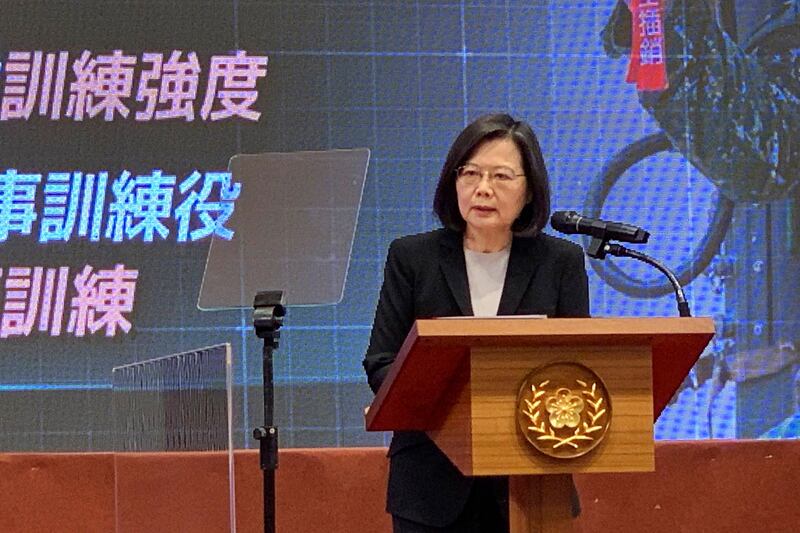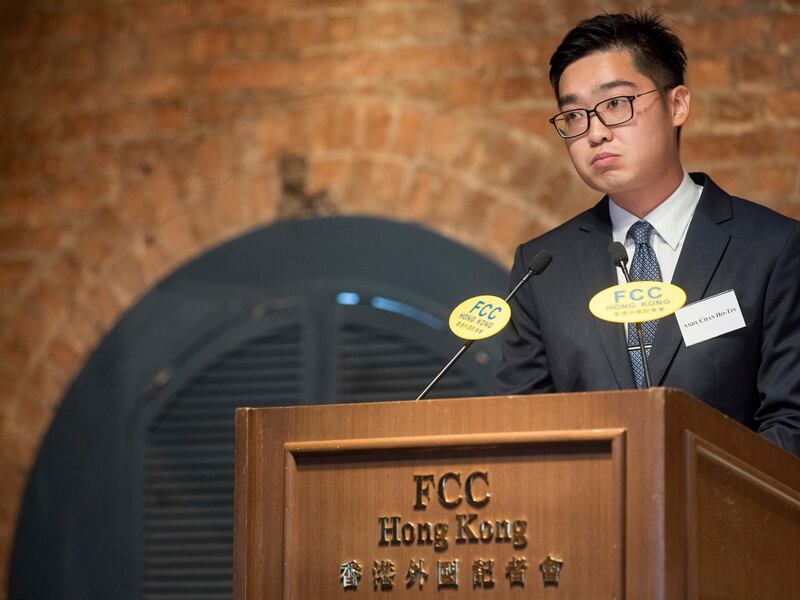Hong Kong should hold off tabling more security legislation to avoid spooking voters at the next presidential election in democratic Taiwan, whose president Tsai Ing-wen won a landslide victory in 2020 after voicing outspoken criticism of the city's crackdown on dissent in the wake of the 2019 protest movement, a pro-Beijing commentator has said.
Lo Man-tuen, vice-chairman of All-China Federation of Returned Overseas Chinese, wrote in Hong Kong's Chinese-language Ming Pao newspaper that planned legislation setting out further bans on behavior deemed "subversive" or "seditious" should be paused for the whole of this year.
Otherwise, Tsai's ruling Democratic Progressive Party could use the move to bolster its campaign ahead of next year's presidential race, Lo, who is also a member of the pro-China Democratic Alliance for the Betterment and Progress of Hong Kong, warned.
"Hong Kong's most urgent mission ... should be to race against time to regain lost opportunities," Lo wrote. "Controversial matters should be set aside."
The city's government announced in October 2022 that it would temporarily shelve Article 23 legislation, which sparked mass demonstrations on the first attempt to table it in 2003, prompting the early departure of then chief executive Tung Chee-hwa.
The announcement came after incoming chief executive John Lee said he wanted to enact the new law – which Beijing says is compulsory under Hong Kong's Basic Law – by the end of 2024 at the latest.
But the move appears to be more concerned with optics than in easing back in the ongoing crackdown on political dissent and public criticism of the authorities.
The most high-profile political trial so far under the draconian National Security Law, which was imposed on Hong Kong by the ruling Chinese Communist Party as a response to the 2019 protest movement, is currently underway, with 47 former opposition politicians and activists facing possible life imprisonment for taking part in a democratic primary election.
And the government recently started adding clauses to procurement and tender processes, including land auction approvals and tenancy agreements, to debar anyone believed to have breached the law, which bans speech or actions anywhere in the world deemed to "incite hatred" of the Hong Kong and Chinese authorities.
National security clauses
Documents issued by the city's Lands Department since November 2022 now show clauses allowing the government to disqualify potential bidders at land auctions and to terminate leases on national security grounds, the Ming Pao reported this week.
According to the Hong Kong Economic Times, such clauses were first included in a government tender for a site at the former airport site at Kai Tak in November.

Virtually all land in Hong Kong is owned by the People’s Republic of China, with the city government disposing of land by granting leases, generally with a 50-year term, the specialist property site Mingtiandi reported on Wednesday.
The language in the Kai Tak tender said a bidder can be disqualified who “has engaged, is engaging, or is reasonably believed to have engaged or be engaging in any acts or activities that are likely to cause or constitute the occurrence of offenses endangering national security.”
Bidders can also be disqualified “in the interest of national security, or [if deemed] necessary to protect the public interest of Hong Kong, public morals, public order or public safety," the report said.
Foreign Correspondents’ Club
Hong Kong's Foreign Correspondents' Club president Keith Richburg, who is also on Radio Free Asia’s board of directors, said in a statement on Nov. 30 that national security clauses had been added to the lease for its clubhouse, which will now run for a further three years from Jan. 2, 2023 to Jan. 1, 2026.
The club ran afoul of the government in August 2018 after it invited independence activist Andy Chan as a speaker, prompting former leader Leung Chun-ying to issue a veiled threat regarding the renewal of its lease.

Advocating independence for Hong Kong was banned under the national security law in 2020, with judges typically taking a very broad view of what constitutes pro-independence speech.
"The lease contains other provisions that are now standard in all government leases, including allowing the Government to terminate the lease at any time with 3 months notice, or immediately if in the interest of national security," Richburg said in a statement on the Club’s website last month.
‘Contradictory messages’
Financial commentator Yim Po-kung told Radio Free Asia that he wasn't surprised by the inclusion of "national security" clauses in day-to-day business transactions.
"This means that land could be seized from companies, whether they are from Hong Kong or headquartered overseas, if they are deemed to have endangered national security," Yim said. "The government says it wants to attract foreign capital [back to Hong Kong after the zero-COVID travel bans]. Will it be adding national security clauses to their preferential terms?"
"For example, if they approve a Google data center, will it have national security clauses in the agreement?"
Yim said the government appears to be sending out "contradictory" messages.
"All of this will make it harder to get back to normal," he said, in a reference to the government's bid to reboot the city's international image as a financial center and recruit global talent in the wake of pandemic restrictions.
Translated by Luisetta Mudie .
